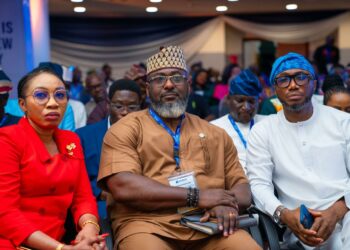The Digital Economy sector of West Africa has been strengthened to achieve its stated objectives as the sub region streamlines its position to gain from the opportunities presented by the African Continental Free Trade Agreement (ACFTA) and grow its economy.
This was one of the takeaways from the two-day maiden edition of the West Africa’s Digital Economy Regional Conference that ended in Abuja on Wednesday with the theme: “Positioning West African Digital Economy for the Future.”
A communique issued at the end of the conference attended by the 15-member Economic Community of West African States(ECOWAS) among other things, outlined that the region must make the necessary investment in broadband penetration in the rural communities to boost penetration and ensure inclusivity in the sector.
The conference was organised by the National Identity Management Agency (NIMC) and other agencies under the Nigerian ministry of communications and digital economy as part of the efforts to achieve the Nigerian National Broadband Plan (2020-2025) to enhance digital skills and literacy.
In his remarks, the minister of communications and digital economy, Prof. Isa Ibrahim Pantami, said the participation of the 15 -member countries of the ECOWAS with many ministers in attendance, has strengthened unity in the region which will spur the collaboration that is “key to the success of digital economy particularly digital inclusion.
“We have to partner and collaborate with others and allow knowledge transfer, technology transfer and come up with the regulatory instruments that will cover the entire continent or sub region.”
Pantami also expressed confidence that with the quality of the participants and the countries that attended, the implementation of the objectives will fast-track the “regional economic diversification agenda through the ICT.”
Pantami sounded optimistic that despite the challenges in the sector, every state Nigeria would have federal government optic fiber cable coverage, adding that the price of data in the country has in the last two years been reduced by 70 per cent despite rising cost of production.
“As of today, we are providing federal government optic fiber cable to every state. We have them in nothing less than 34 states and by April this year, it will be available in each and every state.
“In Nigeria’s National Broadband plan we have a target to reduce the price of 1 gigabyte from 1200 to 390 Naira but as of today, two years before the deadline, the current price of 1 gigabyte is 350.
“The reduction of more than 70 per cent is a huge achievement because the price of every other commodity increases.”
Pantami pointed out that the Digital Economy Conference was predicated on the need for the various West African countries to converge and brainstorm on how to boost the continent’s economy using Information Communication Technology (ICT).
The World Bank, which played a critical part in the conference, urged the federal government to increase its broadband penetration in the rural areas to enable the local dwellers to have increased access to internet services to boost the digital economy drive.
The World Bank country director, Shubham Chaudhuri made the call on the sidelines of the Digital Economy Regional Conference, stressing that Nigeria has great potential in Nigeria’s digital sector, even as he called for more reforms.
“I think the key thing is, how do we make sure that every person, no matter where they are in Nigeria has that same access to the digital economy?
“Nigeria’s young population has tremendous potential but you have to ensure that there is equal access to broadband penetration.
“In places like Lagos, Abuja there is a lot of dynamism already but what the minister has said is getting that access out to the rural areas so that every child and every young person has that access.
“I think the telecom sector has been quite key to Nigeria’s resilience in the last three years,” he said.
The World Bank country director also advised state governments to collaborate with the federal government and private sector to invest by laying fiber optics in the areas.
“I urge states to cooperate with the federal government and make it easy for private firms to lay the fibers for investment.
“Second is digital skills especially for the girl child to have access to digital skills so that they can be able to contribute to areas of growth going forward,” he said.
Also speaking to reporters during the conference, the minister of information and communications of the Republic of Sierra Leone, Mohammed Rahman Swaray, said the conference presents multiple opportunities to network and to share insights and cross-fertilize ideas.
He added that the Abuja conference has an excess bag of experiences that can be utilised to pave the way for Sierra Leon’s digital economy.
“Our country has invested heavily on not only landing the fiber cable but also ensuring that we have taken fiber to 14 of the 16 districts of the country.
“The regional capital cities have all got metro rings with access points which is the last mile connectivity so that people can enjoy the digital,” he said.





